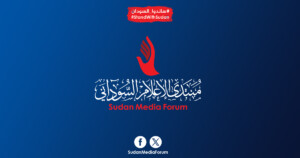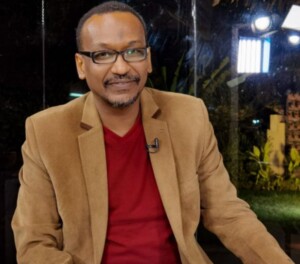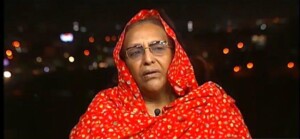Op-ed: Silencing voices – Who speaks and who is silenced?
By Sara Creta: There is a feeling, a widespread common perception among refugees living in camps across Africa and in detention centre in Libya. It’s a sense of injustice and oppression that prevails. ‘We want the world to see us’, or ‘do you know the meaning of justice?’
 Protest by refugees in Tajoura, Libya
Protest by refugees in Tajoura, Libya
By Sara Creta
There is a feeling, a widespread common perception among refugees living in camps across Africa and in detention centre in Libya. It’s a sense of injustice and oppression that prevails. ‘We want the world to see us’, or ‘do you know the meaning of justice?’
While migrants and refugees record their lived experiences on an online cloud, for the fear of losing their memories collected along the journey, their voices struggle to appear. Their existence is recorded in statistics, in camps or detention centres; given categories are created, in a logic of marketing the “wanted” versus the “unwanted”, the brave that deserve praise for resilience and courage (UNHCR).
While their political subjectivity cannot be expressed, refugees who are waiting at the EU borders are not allowed to voice political rights, but to only appeal to a common humanity by showing their wounds (Fassin 2005). Not only trauma and victimization discourse, the so often mentioned humanitarianism, securitization, migration management are also framing the narrative of powerless bodies to be managed. They exist, but their existence is conditioned to the denial of a political agency. They exist because they become victims. They exist because they become ‘refugees’, in the eyes of the UN Refugees agency, holding a certificate in their hands, left alone in a liminal space, where they survive, invisible, facing persecution and daily feeling the meaning of death from the constant sorrow.

Most of the refugees I spoke to, either in Libya, Egypt, Sudan, Niger, Morocco have been using social media to challenge the mainstream constructions of “refugee voices”; digital media have provided an enabling platform for the marginalised and underrepresented voices that have been neglected by the mainstream media and suppressed by authoritarian regimes. But at the same time, they cannot be invisible or “undetectable” and avoid a system of control that collects their personal data and uses it beyond their initial purpose, and in ways that they could not reasonably anticipate.
Here, I utilise Hannah Arendt’s concepts of political theory, such as freedom, political action, and the public space as a starting point to explore their experience. While liberty and autonomy lead to hope, hope is lost during the persistent begging for protection, quest for a piece of paper and a stripped identity that was lost because of the fear of imminent death. Lost together with the control over their lives. And the narrative of protecting refugees and finding solutions for their life, is re-producing this logic where the images of dependency and powerlessness are repeated, in the monopoly of care and resettlement terms, often used to justify a logic of finding ‘durable solutions’, that have left 75 per cent of refugees in situations of protracted displacement.
While the vast majority of refugees remain in the Global South, often in states grappling with instability and widespread poverty, Northern states negotiate their responsibilities with limited quotas and advertise a logic of “durable solutions”. Securing solutions should be more than money; should be about the rights, dignity, freedom of expression and a matter of global justice. But on which occasions the migrants and refugees are able to challenge the hegemonic power structures and reaffirm their own voice? From the lip sewing to the naked bodies, different approaches of migrants and refugees’ resistance are imposing themselves in that Arendtian ‘space of appearing’, becoming public against that system of control that requires their invisibility; in a personalized call for recognition and right claim on the world public stage. While refugees and migrants are often prevented from getting control over their life and future, their voices are struggling to be heard in Europe. With the same logic of exclusion that prevents them from arriving in Europe.

By referring to some of my own experiences as a journalist, I have often been confronted with my right to travel and move freely, contrary to the reality for many people I have met in the world, extremely limited in where, when, and how they could move from place to place, often controlled and criminalised. Taking this conversation further to examine regional and global power dynamics, I found myself embedded in humanitarian discourse banning certain journalistic practices in the name of western ethics; the same ethics of protection that is turning organizations’ trustworthy voices to speak on behalf of refugees and about their experience of forced displacement. As Gajjala says, I had the privilege of being able to speak and write in hegemonic spaces, which are situated “in a field of power and in the production of a particular knowledge”.
I also experience a radical mode of actions staged by migrants and refugees articulating rights and making claims; taking back that political subjectivity that migrants and refugees exercise across borders.

And while people’s humanity is denied and the institutions who should protect refugees are depriving them of their right to hope for a better future, those trapped in countries devastated by civil war or daily at risk of human trafficking are resisting these inhuman policies of premeditated killing and exclusion, and they still have the courage to protest and ask their rights to have rights. They appear in those symbolic spaces of exclusions, border camps in Niger, detention centres in Libya or hotspots in Europe, and they claim their political subjectivity in a territory that most of the time treats them as invisible or mute. .
* This article published by permission of the author.
Disclaimer: The views and opinions expressed in this article are those of the contributing author and do not necessarily reflect the position of Radio Dabanga.
 Sara Creta is a visual journalist and Marie Curie research fellow at Dublin City University, with extensive experience investigating human rights abuses. Over the past years, Sara has worked with humanitarian and human rights organisations and communities in Nigeria, Sudan, Ethiopia, Bangladesh, DRC, Libya, Chad, Cameroon, Morocco, Tunisia, the Gaza Strip and on a rescue ship in the Mediterranean. With an academic background in International cooperation and protection of Human Rights she focuses much of her research and writing on how dissident actors use internet technologies in affecting political action vis-a-vis the horn of Africa region and politics.
Sara Creta is a visual journalist and Marie Curie research fellow at Dublin City University, with extensive experience investigating human rights abuses. Over the past years, Sara has worked with humanitarian and human rights organisations and communities in Nigeria, Sudan, Ethiopia, Bangladesh, DRC, Libya, Chad, Cameroon, Morocco, Tunisia, the Gaza Strip and on a rescue ship in the Mediterranean. With an academic background in International cooperation and protection of Human Rights she focuses much of her research and writing on how dissident actors use internet technologies in affecting political action vis-a-vis the horn of Africa region and politics.
Radio Dabanga’s editorial independence means that we can continue to provide factual updates about political developments to Sudanese and international actors, educate people about how to avoid outbreaks of infectious diseases, and provide a window to the world for those in all corners of Sudan. Support Radio Dabanga for as little as €2.50, the equivalent of a cup of coffee.












 and then
and then